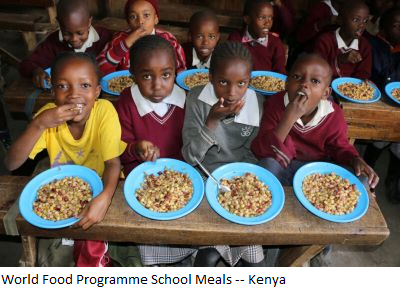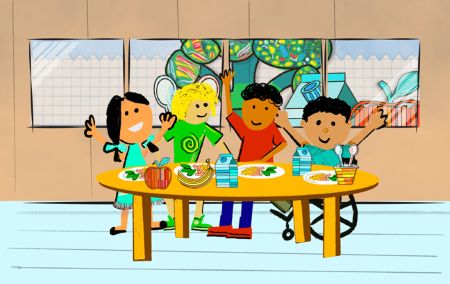
“There are times when I feel so hungry that I think going to school would be a waste. Some days I stay home,” says 15-year-old Martha.
Grace struggles to concentrate on her studies. “I only eat once a day. … Today, I ate pumpkin leaves, but it is not enough.”
Both these girls live in Rumbek, South Sudan. They are two in a tide of many. Across the continent of Africa there are currently millions of children like Martha and Grace, all trying to learn while hungry.
Children Deserve a Chance to Learn Free from Hunger
We know the importance of education for children. We make it a priority. Yet, no matter how much the world invests in classrooms, teachers, textbooks, and access to internet, children cannot learn if they are hungry.
As we learned in a previous Small Sip, malnourishment in children affects brain development, concentration, memory, and available energy. Inevitably, hungry children do less well in school. This is equally true of boys and of girls. However, when food is scarce, girls are often among the worst-affected, eating last and least in many cultures. Currently, women and girls account for 60% of the world’s chronically hungry, and the gendered hunger gap is growing. Girls are more likely than boys to be taken out of school when families come under strain, and for those who do continue to attend school, hunger and malnutrition can severely impact their learning.
In the current global food crisis, girls are also at heightened risk of child and forced marriage. Early marriage can significantly impact a girl’s ability to continue with education. Many are forced to drop out of school in order to focus on domestic responsibilities or to raise children of their own. UNICEF warns that in the Horn of Africa, where the most severe drought in forty years is pushing families to the edge, girls as young as twelve are being forced into child marriage and female genital mutilation (to prepare them for marriage) at alarming rates. 1
Education, and most especially girls’ education, is one of the casualties of hunger.
School Feeding Programs are Part of the Solution

Schools themselves can be an effective means of ensuring that no child goes hungry. Feeding children in school can protect them from malnutrition, increase enrolment, reduce dropout rates, and improve learning.
Children from vulnerable families are often pulled out of school to save on school fees or because they are needed to help at home. A daily school meal can be a strong incentive for families to keep them in the classroom.
Well-designed school feeding programs bring important benefits in terms of nutrition, and strengthen the food security of students, while promoting access, participation, achievement, and performance, particularly in situations of crisis or great vulnerability.
Moreover, well-designed, sustainable school feeding programs are an effective measure to promote equity and inclusion in the most disadvantaged regions of a country. And they can strengthen overall local food production by providing a predictable and consistent market for local produce.
School meal programs are powerful and effective social safety nets for school-aged children. They not only keep children, particularly girls, in school, but help improve learning outcomes by providing better and more nutritious diets. They also support local economies, create jobs and livelihoods in communities, and ultimately help break the links between hunger, an unsustainable food system, and the learning crisis.
Dig Deeper…
- We suggest you begin in South Sudan, with these first-hand accounts from students Martha, Grace, and Hellena . Learn more about their daily lives and hunger’s effects on their education.
- Child marriage on the rise in Horn of Africa as drought crisis intensifies – A sobering and important read from UNICEF.
- Why all the talk about School Meals? – Learn more about the multiple benefits of school meal programs from the Global Partnership for Education.
- Be inspired by this one-minute video from Rwanda on the positive impacts of school meal programs.
- Government of Canada launches consultations on a pan-Canadian school food policy – Read about consultations that are underway to explore how more Canadian children can receive nutritious food at school.
“There can be no contentment for any of us when there are children, millions of children, who do not receive an education that provides them with dignity and honour and allows them to live their lives to the full.” -- Nelson Mandela
[This is the eighth installment in GRAN’s Small Sips series on The Right to Food.]

http://grandmothersadvocacy.org


